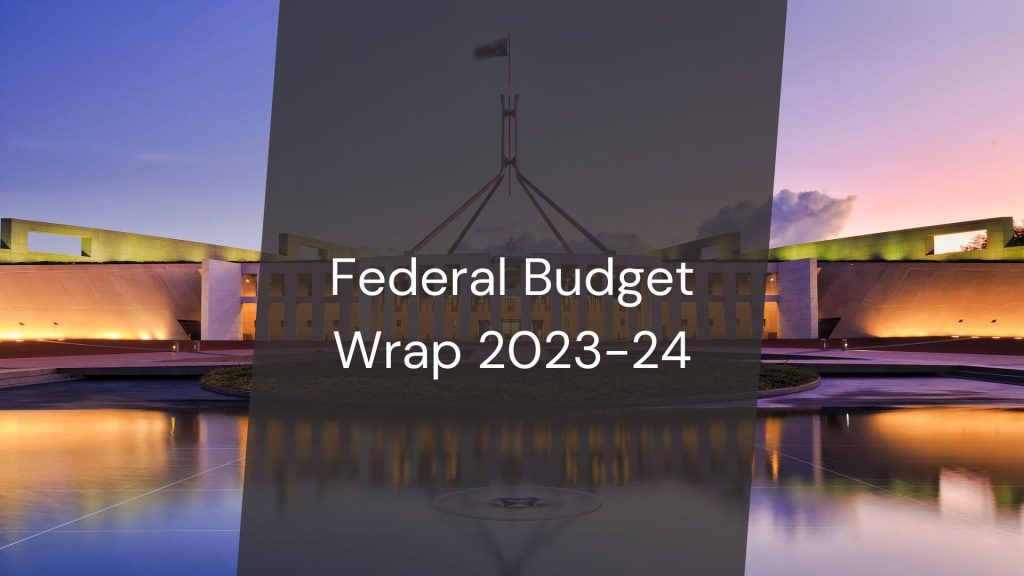Federal Budget Wrap 2023-24 Posted on May 10, 2023

Treasurer, Jim Chalmers, delivered the 2023-24 Federal Budget last night, where the Government has outlined a raft of measures which aim to strike a “considered, methodical balance” between fiscal restraint and supporting Australians through the current difficult times.
The Government has announced a small surplus of $4.2 billion this financial year, the first in 15 years. The turnaround from the $36.9 billion deficit projected in October 2022 was driven by high commodity prices, a strong jobs market and a boost in net migration.
Below we recap some of the key measures proposed in the 2023-24 Federal Budget that may be relevant to you.
The numbers
Some of the key numbers include:
- A surplus of $4.2 billion for 2022/23
- A forecast deficit of $13.9 billion for 2023/24
- GDP growth of 3.25% in 2022/23
- Inflation expected to drop from 6% to 3.25%in 2023/24
- Unemployment expected to rise to 4.25% in2023/24
- Net debt of $548.6 billion in 2022/23
- Wage growth of 4% forecast for 2023/24
Ease of cost of living pressures
Cheaper medicine: The Government is investing $3.5 billion over 5 years to make it easier and cheaper to see a doctor and strengthen the foundations of Medicare. The bulk billing incentive will be tripled for the most common consultations with children under the age of 16, pensioners and other Commonwealth concession card holders. This includes face-to-face, telehealth and videoconference consultations. More than 300 Pharmaceutical Benefits Scheme medicines will be dispensed in greater amounts, phased in from 1 September 2023.
Rent assistance: Strong rental growth has put renters at the centre of the cost of living crisis. To help alleviate the pressures many are facing, the Government will be increasing the maximum rates of Commonwealth Rent Assistance by 15% from September 2023. The measure will cost $2.7 billion over 5 years and is expected to support 1.1 million households receiving Commonwealth Rent Assistance.
Electricity bill relief: The Government has earmarked $3 million to help households and small businesses struggling with their energy bills. From July 2023, it will deliver up to $500 in electricity bill relief for eligible households and up to $650 for eligible small businesses. Eligible households and small businesses include pensioners, Commonwealth Seniors Health Card holders, Family Tax Benefit A and B recipients and small business customers of electricity retailers.
Superannuation
Superannuation concessions: The Government will reduce the tax concessions available to individuals with a total superannuation balance exceeding $3 million, from 1 July 2025. It will bring the headline tax rate to 30%, up from 15%, for earnings on an individual’s total superannuation balance with is greater than $3 million. Those with a total superannuation balance of less than $3 million will not be affected. This measure is expected to impact around 80,000 individuals.
Superannuation Guarantee (SG): Currently, employers are only required to pay their employees’ Superannuation Guarantee (SG) on a quarterly basis. From 1 July 2026, employers will be required to pay their employees’ SG entitlements on the same day that they pay salary and wages.
Small Business
$20,000 instant asset write-off: The Government has pledged to improve cash flow and reduce compliance costs for small businesses by temporarily increasing the instant asset write-off threshold to $20,000, from 1 July 2023 until 30 June 2024. This will allow small businesses to immediately deduct the full cost of eligible assets costing less than $20,000 that are first used or installed ready for use between these dates.
The $20,000 threshold will apply on a per asset basis, so small businesses may have the opportunity to instantly write off multiple assets. As for assets valued at $20,000 or more (which cannot be immediately deducted), these can continue to be placed into the small business simplified depreciation pool and depreciated at 15 per cent in the first income year and 30 per cent each income year thereafter.
Housing
Family, friends to team up to buy property: In a shake-up of the Home Guarantee Scheme (HGS) aimed at helping more Australians get on the property ladder, eligibility will be expanded to allow any two eligible people to be joint applicants for a guarantee beyond spouses, and de facto partners – a move which could give friends and family members the chance to team up to buy a first home.
Other changes to the Home Guarantee Scheme will include:
- Allowing non-first home buyers who have not owned a property in Australia for at least 10 years to access the First Home Guarantee and Regional Home Guarantee
- Allowing a single legal guardian of children to access the Family Home Guarantee
- Allowing Australian permanent residents to access the Scheme.
National Housing Accord: The government has brought together states and territories, the Australian Local Government Association, investors and the construction sector through the National Housing Accord, with a shared ambition to boost supply and build one million new homes from 2024.
Aged Care
Pay rise for aged care workers: A major centrepiece of this year’s Budget is an $11.3 billion package aimed at boosting the pay of aged care workers to better reflect the work they do. More than 250,000 aged care workers (including registered nurses, enrolled nurses, and home care workers) will see their wages increase by 15 per cent from 1 July 2023 — which the Government notes is the largest increase to award wages in a work value case under the Fair Work Act.
The pay rise is estimated to attract 10,000 more workers to the aged care sector, which the Fair Work Commission has acknowledged has been historically undervalued. It will also hopefully bring the Government a step closer to fulfilling its election promise of having a registered nurse on duty 24/7 in every aged care facility.
Aged care regulatory reform: The Government will provide additional funding of $309.9 million over 5 years from 2022–23 to implement the recommendations from the Royal Commission into Aged Care Quality and Safety and other initiatives to strengthen the regulation of the aged care sector and improve the health and safety of older Australians receiving aged care. Funding includes, for example:
$139.9 million over four years from 2023–24 to improve the accountability and transparency of approved aged care providers through enhancements to the Star Rating system $12.9 million over two years from 2023–24 to improve food and nutrition in aged care through the development, monitoring and enforcement of food and nutritional standards.
Renewable energy
This Budget accelerates investment in renewable energy through the Capacity Investment Scheme, which will unlock over $10 billion of investment in our grid.
The government’s $2 billion ‘Hydrogen Headstart’ will accelerate large-scale renewable hydrogen projects, aiming to position Australia as a world leading hydrogen producer and exporter.
National Reconstruction Fund
The Government has committed $15 billion to the National Reconstruction Fund, one of the largest investments in manufacturing in Australia’s history. The National Reconstruction Fund will partner with the private sector to invest in priority areas that leverage Australia’s natural and competitive strengths in renewables and low emissions technologies, medical science, transport, value-add in agriculture, forestry, and fisheries, value-add in resources, defence capability and enabling capabilities.
If you require any additional information, or have questions about what the announcements might mean for your financial situation, please talk to us.





